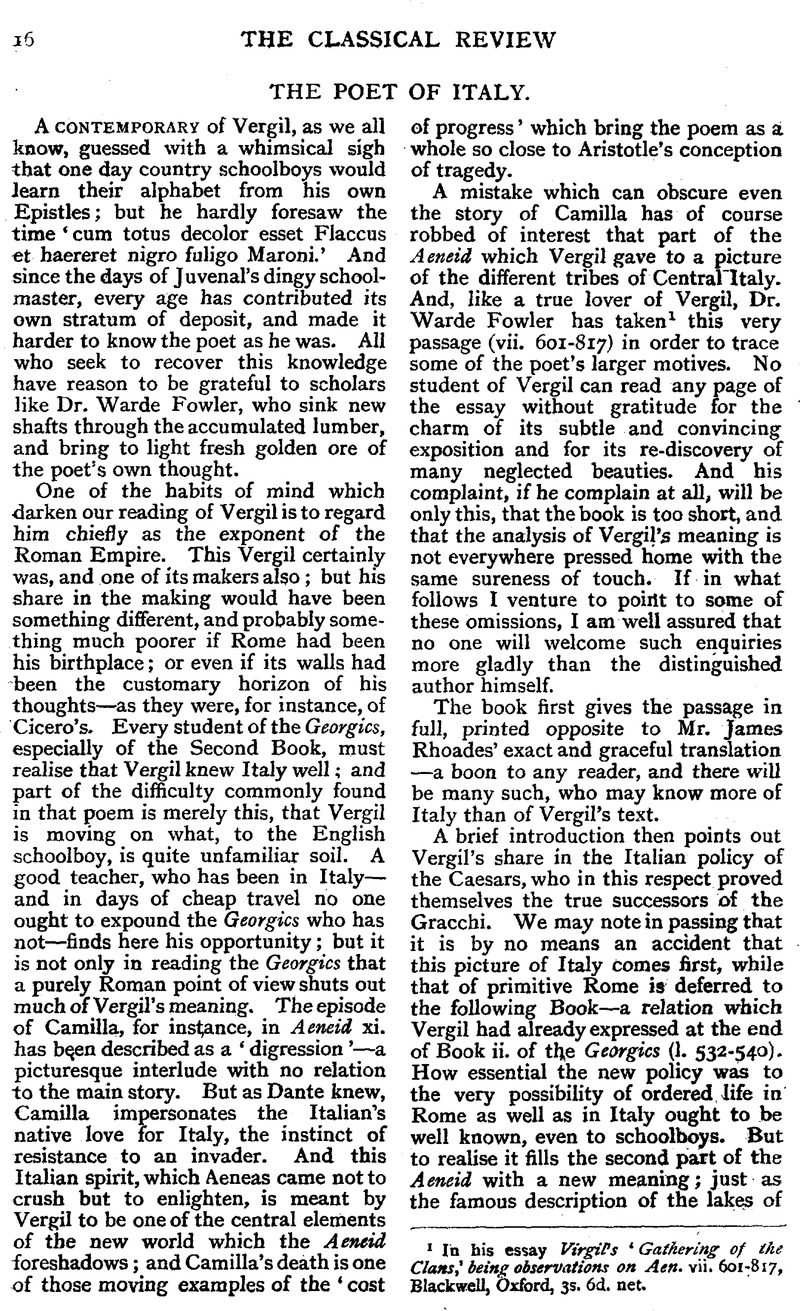No CrossRef data available.
Article contents
The Poet of Italy
Published online by Cambridge University Press: 27 October 2009
Abstract

- Type
- Original Contributions
- Information
- Copyright
- Copyright © The Classical Association 1917
References
page 16 note 1 In his essay Virgil's ‘Gathering of the Clans,’ being observations on Aen. vii. 601–817, Blackwell, Oxford, 3s. 6d. net.
page 17 note 1 But in this passage surely euntibus is constructed both with dat and with cedunt (cf. ii. 633); and does not magno fragore also go with both verbs? This ‘interwoven’ order is characteristically Vergilian; cf., e.g., 1. 751, where both super galeam and comptus go with both fronde and oliua; so also in 702 (sonat longe), 779–80 (litore effudere), 812–3 (illam miratur et prospectat euntem) we have phrases which in prose would be units distributed for a balance of sound between the two co-ordinate halves of a sentence. See more fully C. R. XIV. (1900), p. 357. Yet I entirely accept the view that fragore is kept to the end on purpose, to leave with the reader the last overwhelming impression which the avalanche (for that is surely part of what Vergil meant) makes upon the spectators in the valley below.
page 17 note 2 See ‘Some Votive Offerings to the Venetic Goddess Rehtia’ in the Journal of the Royal Anthropological Institute, XLVI. (1916), 223 and 229.
page 18 note 1 The same writer makes the blunt assertion that ‘the notions of tenderness and pity’ ‘are not there’ i.e. in the line beginning parcere subiectis. It is a difficult matter to argue; one might collect every phrase of compassion in Latin literature, and yet a stout critic of stone walls could always rejoin that he did not see it. The error is dangerous because it contains a fraction of truth, a fraction especially familiar to those whose study runs mainly in military Latin. The technical terms of the soldier gather on his lips a very precise and concrete meaning, and parcere is one of them but their technical use does not always exhaust their meaning for ordinary purposes. The substantive exercitus has lost every scrap of its original meaning as a noun of action (‘training’), but exercere and its other derivatives mean a great deal more than ‘to drill’; deficere is used as a military term, but that does not prevent its use of eclipses or of fainting in sickness; dilectus certainly has no notion of special personal regard; but diligo has nothing else. Those who are content to interpret Vergil by himself may see what the word meant to him in such passages as Georg. ii. 363, parcendum teneris, where the second word is alone enough to dispose of the stone-wall doctrine. Perhaps, too, Horace knew something of what his friend had meant by the line (Aen. vi. 854) when two years after Vergil's death, in a poem full of Vergilian reminiscences, he paraphrased it in words which it is strange to have to quote (Carm. Saec. 51) ‘bellante prior, iacentem Lenis in hostem.’ Or shall we be told that lenis also is ‘a scornful word’?
page 19 note 1 There are other things in the argumentum which I venture to think are just like Turnus, but I will not labour the matter, partly because I cannot help hoping that Dr. Warde Fowler will have been roused (as the rest of us have been) by his own challenge, and in a second edition, which ought soon to be called for, may expound the whole passage.
page 19 note 2 The linguistic evidence Dr. Warde Fowler (possibly misled by Niebuhrian philology) seems to overlook. Claudius is the older, Clausus the younger form of the name; and the tradition goes back to the time when even in Sabine speech the gens was known as Claudia; see the evidence in the note ad loc. in the Pitt Press edition of Livy II.


